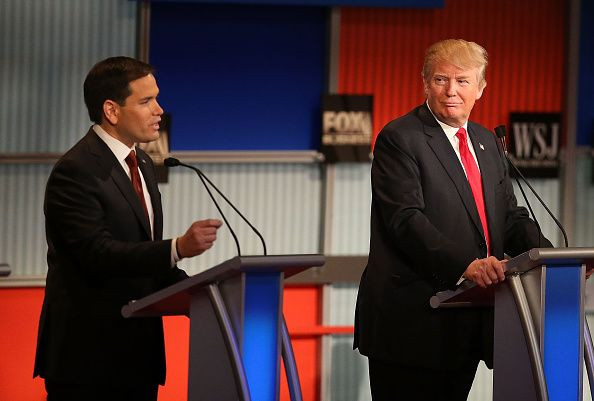Election 2016 Polls: Before GOP Debate In Miami, Where Do The Candidates Stand?

Can the Republican establishment stop Donald Trump? It's still unclear, but its next shot to try will be Thursday in Miami.
Trump, Florida Sen. Marco Rubio, Texas Sen. Ted Cruz and Ohio Gov. John Kasich are scheduled to face off at a debate sponsored by CNN, the Washington Times and Salem Radio Network only five days before next Tuesday's crucial Florida primary. The debate is set to begin at 8:30 p.m. EST.
Debates put the focus on candidates' talk, but the polls are almost as important. Heading into the debate, Trump was maintaining his huge lead nationally with the support of more than 40 percent of GOP primary voters. Cruz was in second place with about 20 percent followed by Rubio with 18. Kasich trailed them all with just 9 percent of the vote, according to survey aggregator the HuffPost Pollster.
The story in Florida itself, which is worth 99 delegates for the winning candidate and thus has become a primary battleground state, was a little different. On Tuesday, RealClearPolitics had Trump leading by about 16 points over Rubio, who had the backing of about 26 percent of voters in the Sunshine State. Cruz was in third place, and Kasich was again in fourth place.
One place Kasich was doing well was in his home state of Ohio. In the Buckeye State, Public Policy Polling recently found Trump — with 38 percent support — had only a three-point advantage over the governor — with 35. Cruz was in second place, and Rubio was in a distant third.
No matter which candidate you're behind, make sure to take his poll numbers with a side of skepticism. As FiveThirtyEight Editor-in-Chief Nate Silver told NPR recently, the results aren't always accurate — especially when they're taken in spring of an election year as opposed to the fall.
"So you can look at the polls, but you need these very big margins of error around them. And it's kind of an exercise in humility in the primaries, whereas in the general election, they have a record of being pretty accurate," he said. "So basically, all that we do is we run around during the primaries telling people — be careful. Be careful. The polls are not that reliable."
© Copyright IBTimes 2024. All rights reserved.






















